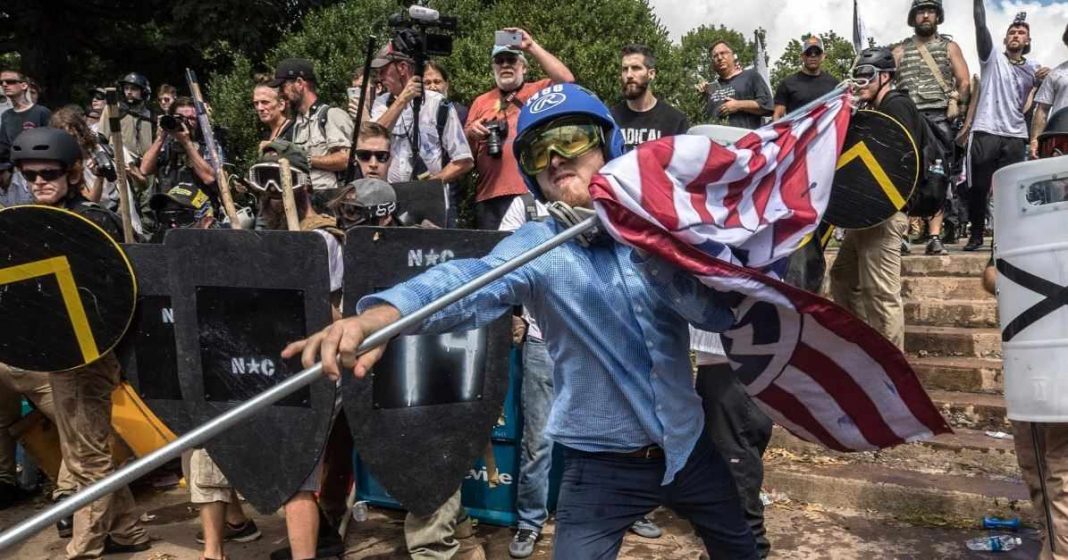The principal organisers of the fatal far-right gathering in Charlottesville, Virginia, in 2017 were held accountable under state law for injuries to counterprotesters by a jury on Tuesday, paying more than $25 million in damages to the counterprotesters. However, the jury was unable to reach a decision on two federal conspiracy counts.
Still, the conviction was a strong condemnation of the defendants, who were a collection of white supremacists, neo-Nazis, and supporters of the Confederacy. According to Virginia law, they were found to have participated in a conspiracy that resulted in injuries during the event. Initially intended to be a protest against the removal of a Confederate monument, the “Unite the Right” march turned deadly when a vehicle driven by one of the defendants collided with Heather Heyer, 32, who was killed as a result.
Civil complaint filed in U.S. District Court in Charlottesville by four men and five women, including three of those who were wounded when Ms. Heyer was slain, is now being heard. Post-traumatic stress disorder (PTSD), sleeplessness, difficulty to focus, flashbacks, and panic attacks, according to the plaintiffs, who sustained concussions and a broken leg as a result of the accident.
Several of the plaintiffs claimed compensatory and unspecified punitive damages, including reimbursement for medical expenses as well as compensation for pain and suffering ranging from $3 million to $10 million, depending on the severity of their injuries.
There were a number of notable defendants, including former alt-right leader Richard Spencer; Jason Kessler, who planned and promoted the rally; and Christopher Cantwell, a loud neo-Nazi podcaster who is currently spending 41 months in federal prison for threats and extortion in a different case.
It was punitive damages that were granted the highest amounts, with 12 people being sentenced to pay $500,000 each and five white nationalist groups being penalised $1 million each as part of the settlement. Regardless of whether or not punitive damages are awarded, they will be shared equally among the claimants.
After being held accountable for $12 million in punitive damages and hundreds of thousands of dollars in medical bills resulting from assault, abuse, and mental distress, James Fields was sentenced to several life terms for the murder of the counterprotester with his automobile.
Civil lawsuits were filed by the counterprotesters, who claimed that in addition to holding the march organisers accountable for the violence, they hoped to deter hate groups from staging similar toxic spectacles in the future. In the absence of decisive action by the criminal justice system, they relied on civil lawsuits to achieve their goals.
It was planned as a protest against the removal of a monument of Robert E. Lee, which has since been demolished, and included radicals wielding torches and yelling racist chants. The demonstration took place in 2017. However, its overarching goal was to elevate the extreme right from the online edges to the national political mainstream.
The federal charges centred on whether the rally organisers had engaged in a race-based violent conspiracy, which is prohibited under a federal law known as the Ku Klux Klan Act, which was enacted in 1871 to prevent vigilantes from depriving newly freed slaves of their civil rights after they were granted freedom.
Because of the coronavirus pandemic, the four-week trial had been delayed for months, highlighting how much the rally organisers and their organisations had already been sidelined, squabbling among themselves, and financially strapped in the aftermath of the violent debacle in Charlottesville, Virginia. Mr. Spencer, who represented himself throughout the trial, characterised the case as “financially crushing” in 2020, according to the New York Times. Seven defendants chose to remain silent during the hearings. The court will deal with each of their cases on an individual basis.
Samantha Froelich, who was dating two of the rally’s main organisers at the same time in the months leading up to the rally but has since left the movement, testified that hitting protesters with cars was discussed at a party earlier that summer in Mr. Spencer’s apartment in Alexandria, Va., known as the “Fash Loft,” which is short for fascist and is the nickname for Mr. Spencer’s apartment.
It brought to life the hate and rage expressed by far-right organisations, particularly on the streets of Charlottesville, and brought the trial to a close. Hundreds of men carried torches as they marched through the streets on the eve of the demonstration, singing racist chants in the tradition of Ku Klux Klan and Nazi marches. There was a lot of hate imagery in the evidence, as well as in the many films and social media postings that were shown. There were Nazi emblems and stiff-armed salutes, there was adulation for Hitler, and there were comments that nonwhite races were inferior.
On social media, supporters of the far-right posted expletive-laced comments against Black and Jewish people, while the defendants themselves offered their own perspective on the case. President of the League of the South (which aspires to construct a white ethnostate) Michael Hill, 69, said in an online interview that courtrooms were “front lines” in the war.

